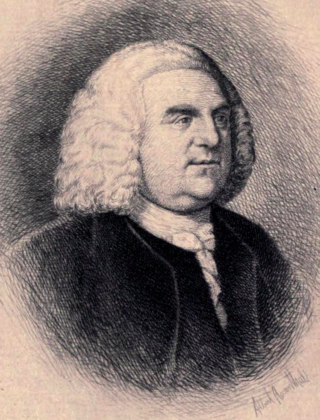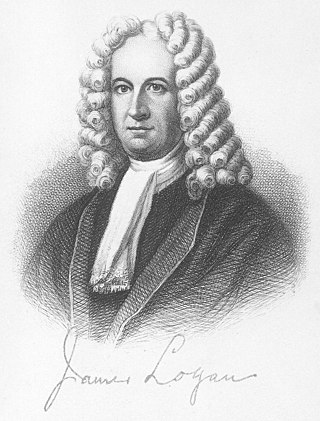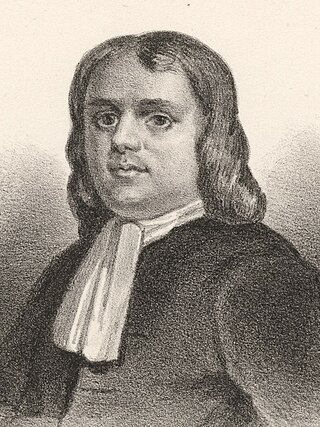The Philadelphia Election Riot in 1742 was a riot that occurred due to political disagreements among the constituents of the increasingly diverse population in the city. [1] Politics in Pennsylvania, including Philadelphia, had long been dominated by the Quakers but, with their political dominance increasingly threatened by the predominantly Anglican Proprietary Party, tensions grew in the city. The Quakers and Anglicans were predominantly led by Isaac Norris II and William Allen, both of whom were well respected and held significant political power. [2] In an attempt to swing the vote, the Proprietary Party "hired armed sailors" to disrupt the Quakers who, in their own attempt, were bringing "unnaturalized Germans from the country to vote." [3] On voting day, October 1, 1742, violence broke out between the two sides.
The Quakers had dominated the political landscape of Philadelphia for years and the growing German population seemed to be a means by which they could continue this domination. Realizing this, John Kinsey and, particularly, Isaac Norris II led the Quakers in attempting to convince the Germans to vote along with their interests. [4] Attempts to persuade the increasing German population seemed to be paying off, as voter turnout tripled between 1739 and 1740. [5] The German population found the pacifism of the Quakers attractive, as the former saw it as protection from the draft and high taxes. [5] However, John Isaac also drew the Germans to their cause by making property available to them, in addition to doing regular business with the Germans. [4]
Although the Quakers had won the favor of the German citizens, they, like the Anglicans, resented the Germans who had begun migrating to the colony after 1715. [6] By the 1750s, the German population of Pennsylvania had increased greatly, with 40% of the colony's constituents being German. [6] Throughout the same decade, the German vote was effectively split and didn't play much of a role in elections; however, that began to change in the 1760s, when the Propriety Party began to recruit the equally disliked Dutch to their side, and the Quakers saw it necessary to redouble their efforts to gain the support of the Germans. [6] The Germans were much more fond of farming than politics, thus, rather than striving to gain political power themselves, they fancied their position as swing voters, as it ensured that they would also benefit from those who needed their support. [6]
Failing to win the favor of the German vote, William Allen and his fellow Anglicans sought to amend the election process by reviving a 1739 election law that provided party-specific election inspectors. [7] In part, this was because of the distrust of the Quakers which derived from their prior electoral day transgressions. The Quakers, from 1739 to 1741, had taken advantage of the voting process. The elected official would collect the filled out ballot from the citizen and run it upstairs to the counting area, by blocking the stairs and only allowing favorable ballots through. [4] Allen hoped that the revival of the election law would allow for a fair vote. However, the two sides could not agree on the means by which to guarantee a fair election and, as such, distrust grew between the two sides. [4]
With election day coming fast, both sides had damning rumors swirling around their respective camps. The Quakers believed that the Anglicans were going to attack the polls with a large number of vigilantes, which they were, as a few dozen sailors had been hired. [5] [4] On the other hand, the Anglicans believed that the Quakers were upping their effort to obstruct the voting officials by bringing even more Germans, which they were, and other citizens who were seen as unqualified to vote. [4]
On October 1, 1742, the "Bloody Election," as scholars refer to it, led to an outbreak of violence between the Quakers and Proprietary Party. The voting was to take place in the "Market Place" in the city of Philadelphia and Philadelphia County elections at 9:00 am, and city officials had asked that no weapons be carried due to a fear of violence. [4] At the polls, the two sides debated once more over who should be the inspectors of the election. [7] While the debate was occurring, about fifty to eighty sailors carrying blunt objects, mostly clubs, gathered among the crowd. [4] Just as Isaac Norris II was chosen as an inspector, the mob of sailors violently assaulted the crowd. [4]
Even though the sailors were destroying property and injuring many, when Allen was asked to call the sailors off, he claimed they had as much right to be there as the Dutch and Germans. [4] Eventually, German and Dutch citizens picked up makeshift weapons of their own to beat back the assailant sailors, who retreated to their ships. [4]
William Allen was widely blamed for the riots and, thus, the riot politically benefitted the Quakers, who did better in the coming elections, as the Anglican's Proprietary Party lost the election in a landslide. [4] Reports show that many voters had altered their original ballots, crossing out their original vote for the Proprietary Party and instead voting for the Quaker Party. [3]
Fifty-four sailors and party leaders were jailed. Allen, the Proprietary leader, in an effort to clear his name, sued one of the Quaker leaders for claiming that Allen had planned the assault. The matter was turned over to the Quaker-led Assembly (over Allen's objections) for investigation. The Assembly cast the investigation as the result of public outcry, when it is likely none truly existed. [3] After questioning forty-nine witnesses, most of whom were Quakers and included none of the sailors. The Assembly ruled that Allen, his business partner, the mayor, and two others (all Anglicans) should be investigated for being negligent in their duties and subverting the Pennsylvania Charter. Allen was ruled the instigator of the riot. After months of investigation, they turned the matter over to the Quaker-controlled Supreme Court. [3]
The Governor, an Anglican, stated that the city's Mayor's Court had jurisdiction, meaning the Recorder, Alderman, and Mayor (all Anglicans) would hear the case. The Assembly protested that the Mayor was one of the accused and would be hearing his own case. [3] Eventually, a Quaker-devised compromise was reached. Charges were withdrawn, as was the original slander suit, and steps were taken to define election procedures and prevent future riots. [3]
The Philadelphia Election Riot, along with other riots taking place during the same time period in cities like New York and Boston, are important in examining the American Revolution. [6] Riots taking place in these cities represented a radical change in the way that citizens interacted with their government. "This transformation involved quiescent lower-class elements; the organization of political clubs, caucuses, and tickets; the employment of political literature and inflammatory political rhetoric as never before; the involvement of the clergy and churches in politics; and the organization of mobs and violence for political purposes." [6]

George Mifflin Dallas was an American politician and diplomat who served as mayor of Philadelphia from 1828 to 1829, the 11th vice president of the United States from 1845 to 1849, and U.S. Minister to the United Kingdom from 1856 to 1861.

Muncy is a borough in Lycoming County, Pennsylvania, United States. The name Muncy comes from the Munsee Indians who once lived in the area. The population was 2,442 at the 2020 census. It is part of the Williamsport, Pennsylvania, Metropolitan Statistical Area. Muncy is located on the West Branch Susquehanna River, just south of the confluence of Muncy Creek with the river. Currently the borough president is Bill Scott and the mayor is Jon Ort.

The Philadelphia nativist riots were a series of riots that took place on May 6—8 and July 6—7, 1844, in Philadelphia, Pennsylvania, United States and the adjacent districts of Kensington and Southwark. The riots were a result of rising anti-Catholic sentiment at the growing population of Irish Catholic immigrants. The government brought in over a thousand militia—they confronted the nativist mobs and killed or wounded hundreds of anti-Catholic rioters.

The city of Philadelphia was founded and incorporated in 1682 by William Penn in the English Crown Province of Pennsylvania between the Delaware and Schuylkill rivers. Before then, the area was inhabited by the Lenape people. Philadelphia quickly grew into an important colonial city and during the American Revolution was the site of the First and Second Continental Congresses. After the Revolution the city was chosen to be the temporary capital of the United States. At the beginning of the 19th century, the federal and state governments left Philadelphia, but the city remained the cultural and financial center of the country. Philadelphia became one of the first U.S. industrial centers and the city contained a variety of industries, the largest being textiles.

John Dickinson, a Founding Father of the United States, was an attorney and politician from Philadelphia, Pennsylvania, and Wilmington, Delaware. Dickinson was known as the "Penman of the Revolution" for his twelve Letters from a Farmer in Pennsylvania, published individually in 1767 and 1768, and he also wrote "The Liberty Song" in 1768.

William Allen was a wealthy merchant, attorney and chief justice of the Province of Pennsylvania, and mayor of Philadelphia during the colonial era. At the time of the American Revolution, Allen was one of the wealthiest and most powerful men in Philadelphia. A Loyalist, Allen agreed that the colonies should seek to redress their grievances with British Parliament through constitutional means, and he disapproved of the movement toward independence.

The history of Pennsylvania stems back thousands of years when the first indigenous peoples occupied the area of what is now Pennsylvania. In 1681, Pennsylvania became an English colony when William Penn received a royal deed from King Charles II of England. However, European activity in the region precedes that date. The area was home to the Lenape, Susquehannocks, Iroquois, Erie, Shawnee, Arandiqiouia, and other American Indian tribes. Most of these tribes were driven off or reduced to remnants as a result of diseases, such as smallpox.

Andrew Hamilton was a Scottish lawyer in the Thirteen Colonies who settled in Philadelphia. He was best known for his legal victory on behalf of the printer and newspaper publisher John Peter Zenger. His involvement with the 1735 decision in New York helped to establish that truth is a defense to an accusation of libel. His eloquent defense concluded with saying that the press has "a liberty both of exposing and opposing tyrannical power by speaking and writing truth."

James Logan was a Scots-Irish colonial American statesman, administrator, and scholar who served as the fourteenth mayor of Philadelphia and held a number of other public offices.
The Buckshot War was the outbreak of unrest in Harrisburg, Pennsylvania that transpired after the Pennsylvania gubernatorial and legislative elections in 1838 when both the Whig and Democratic parties claimed control over the Pennsylvania House of Representatives.

Clement Plumsted was native of Norfolk and among the East Jersey proprietors associated with William Penn. A wealthy Quaker merchant, he served as mayor of Philadelphia in 1723, 1736, and 1741, as well as a Philadelphia councilman, alderman, and justice, and member of the Pennsylvania Provincial Council. He was also the father of William Plumsted, who also served as mayor of Philadelphia.
Thomas Griffitts was Mayor of Philadelphia on three occasions and judge of the Supreme Court of Pennsylvania.

Isaac Norris was a merchant, slave trader and prominent figure in provincial Pennsylvania, including mayor of Philadelphia in 1724.

Isaac Norris was a merchant and statesman in the colonial-era Province of Pennsylvania, in British America.

During the American Civil War, Philadelphia was an important source of troops, money, weapons, medical care, and supplies for the Union.
The Committee of Seventy is an independent, nonpartisan, nonprofit organization which advocates for the improvement of government in Philadelphia and Pennsylvania. Founded in 1904, its board of directors is made up of 70 business, legal, and civic leaders. The Committee of Seventy focuses on issues such as elections and voting, campaign finance, ethics and transparency, and redistricting.

Mary "Polly" Norris Dickinson was an early American land and estate owner and manager. She is known for her ownership of one of the largest libraries in the American colonies, her participation in political thought of the time, and her presence in or near events of the Constitutional Convention, including her marriage to Framer John Dickinson, one of the early drafters of the Constitution and one of its signers on behalf of the colony of Delaware. They bequeathed much of their combined library to the first college founded in the new United States. The college was originally named "John and Mary's College", by Benjamin Rush, for Norris Dickinson and her husband and is now called Dickinson College.
Hannah Griffitts (1727–1817) was an 18th-century American poet and Quaker who championed the resistance of American colonists to Britain during the run-up to the American Revolution.
The Proprietary Party, also known as the Gentleman's Party, was a political party in the Pennsylvania Colony, primarily concerned with Anglicanism and supporting the rights of the colonies hereditary proprietors, the Penns. They were typically in opposition to the Quaker Party, which sometimes resulted in violence.